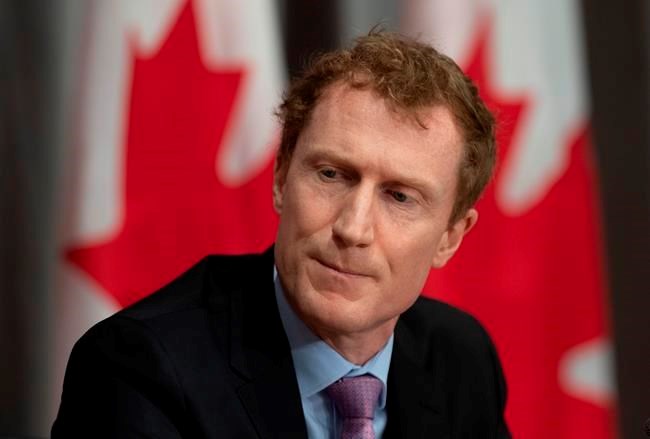OTTAWA — Indigenous Services Minister Marc Miller says Canada needs a reckoning over a repeated and disgusting pattern of police violence against Indigenous people.
Miller says he "watched in disgust" video and reports this week of violence against a 22-year-old Inuk man in Nunavut and a 26-year-old First Nations woman in New Brunswick.
In the first, a graphic video shows an RCMP officer in Nunavut ramming the door of his car into the man walking along the road in Kinngait Monday evening. In the second, police went to check on the well-being of 26-year-old mother Chantel Moore in Edmundston, N.B., Thursday evening, and ended up shooting and killing her.
"A car door is not a proper police tactic, it's a disgraceful, dehumanizing and violent act," Miller said, at a news conference on Parliament Hill Friday morning. "I don't understand how someone dies during a wellness check. When I first saw the report I thought it was some morbid joke."
Miller was there to provide an update on the status of COVID-19 cases in Indigenous communities, but spent most of the nearly hour-long event answering questions about police violence and racism in Canada.
"Frankly along with many Canadians, Indigenous Peoples living in Canada, politicians in Canada, I'm pissed, I'm outraged. There needs to be a full accounting of what has gone on. This is a pattern that keeps repeating itself."
Prime Minister Justin Trudeau echoed him in a separate appearance Friday, saying he would be discussing the issue with the federal cabinet and the commissioner of the RCMP.
Late in the day, RCMP Commissioner Brenda Lucki released a statement saying the force "is taking a clear stand against all forms of racism and discrimination."
Lucki focused on anti-black racism, amid protests over the death in American police custody of a black man, George Floyd, but wrote that all forms of bias are pernicious.
"If we uphold fairness and justice, it's for everyone who has suffered injustices — both in our communities and in our workplaces — especially, Black Canadians and racialized Canadians and Indigenous persons, who have endured many wrongs throughout our shared history," she wrote, and called on Mounties and others to speak out if they see somebody doing wrong.
She closed by quoting Audre Lorde, a black American lesbian poet and activist: "It is not our differences that divide us. It is our inability to recognize, accept and celebrate those differences."
Earlier in the day, Trudeau refused to say specifically what the federal government might do about racism and needless violence in policing.
"We have, continue to have, systemic racism in this country, systemic discrimination, that means racialized Canadians are vulnerable in these situations."
This isn't new, he said, but recent events have illuminated it, including for people who had not really seen it before.
The man who was struck by the officer's car in Nunavut was arrested and later beaten by another man also in the holding cell he was placed in, requiring him to be airlifted to Iqaluit for treatment. The 22-year-old, whose identity has not been made public, told CBC News in Nunavut that he wants the police officers involved in his arrest to be charged.
The Ottawa Police Service, which does independent investigations of police in Nunavut, has sent a team there but the officer who arrested the man has not been charged or suspended. He was flown out of the community and is on administrative leave.
Quebec's independent police investigation agency is going to help with the Edmundston shooting at the request of the RCMP, which is providing forensic support.
Moore was killed overnight Thursday after police were asked to do a wellness check. Edmundston police say their officer encountered a woman with a knife making threats. She was shot and killed at the scene.
Miller said he wants answers, and the family deserves answers, quickly.
"It was a wellness check and someone died," he said. "I can't process that."
Miller spoke of how horrified he was to see the physical fear expressed by community members when he and his staff visited Tyendinaga Mohawk Territory in February, during rail blockades protesting in solidarity with B.C. First Nations over the building of a natural gas pipeline through their territory.
"I felt safe around police forces and they didn't. I can't speak for them. But I can see it. It's palpable. It's painful."
Miller said as Canadians look south to the police violence against black Americans they need to be seeing and thinking more about what is happening in our own country.
"It is something we need to reckon as a society," he said.
Miller said he is open to the idea of adding body cameras to all police though he said videos coming from the United States prove they have not stopped the violence there. He also said police forces need to do better with both recruitment and training. It's not just rank-and-file officers but the senior leadership of police forces who need to do it, said Miller.
This report by The Canadian Press was first published June 5, 2020.
Mia Rabson, The Canadian Press
Note to readers: This is a corrected story. An earlier version said Miller saw fear of police in his staff during a visit to Tyendinaga Mohawk Nation.



